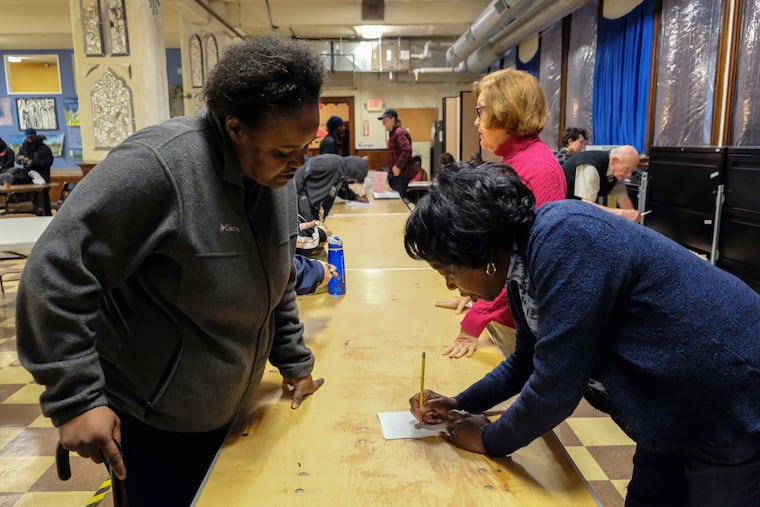Mail for the homeless: A local lifeline for people off the grid
Since 2010, Broad Street Ministry has served as a post office for people experiencing homelessness.

Shuffling slowly with her cane, Dee McDowell lined up to receive her mail in a large, well-lighted room at Broad Street Ministry on the Avenue of the Arts.
Once, she worked in a retail store, and had an actual address. But McDowell, 48, from North Jersey, now lives on the streets and in shelters. Ask what happened and she’ll recite a dismaying litany of calamities: mental illness, abuse, diabetes, and something dreadful about her spine.
She’s here awaiting correspondence from her bank. Maybe they’ll replace her debit card, get her going again — back on the grid, back from the nowhere.
“Here, you get your mail and it’s never stolen,” McDowell said, marveling at those two facts. “The people who run it are pleasant. They want to help.”
Since 2010, Broad Street Ministry has served as a kind of post office for people experiencing homelessness. Those who comes in can claim the ministry’s address as their own.
Currently, more than 3,200 people actively use the mail service at the ministry, which is not a shelter, but offers meals, medical service, and other amenities for the homeless in a large, Gothic church across from the Kimmel Center for the Performing Arts.
Last year, ministry volunteers handled 154,000 pieces of mail for guests, as they are called. It’s not uncommon for individual shelters to accept mail for clients, experts say. But Broad Street is believed to be the city’s largest mail service for people without a home.
Along with letters from loved ones, Social Security checks, and packages, guests say the mail service helps them obtain birth certificates and identification, impossible to do without an address.
When applying for official IDs or licenses, guests can write in the ministry’s address of 315 S. Broad St. For some, it’s nothing less than salvation.
According to a recent survey of people who’ve used services at Broad Street, 33.5 percent said that they had received IDs through the mail that ultimately allowed them to obtain housing. Sixty-four percent said those IDs helped them get benefits. And 33 percent said they were able to use the IDs to land jobs.
If you’re somewhere, you’re someone, many of the guests believe.
“Getting mail here is one way of proving you exist,” said Brenna McGinnis, a shelter director. “An address gives you the dignity of being able to show that."
The ministry mail service is incoming, not outgoing. No guest can buy stamps, or post a package.
Collecting mail at Broad Street "is just a good way to stay in contact with your people,” said Adrian Davis, 25, originally from Texas, now living rough in Philadelphia.
And, he said, coming into the ministry for mail allows all the folks living outside to check in with street acquaintances and friends as they sort through their letters. “We bounce situations off each other, see where we went wrong, the things we did,” Davis said.
Sam Steffen, who calls himself the postmaster general of Broad Street Ministry, runs the mail service wearing a blue U.S. Postal Service hat. “Mail,” he likes to say, “is a human right, and is not only for people who are tied to a property.”
A former member of AmeriCorps — a kind of domestic Peace Corps whose members do public-service work — Steffen, slender and youthful in a red flannel shirt, has a master’s degree in theology from Vanderbilt Divinity School in Nashville.
“People here are sometimes in desperate situations, waiting for something they need in the mail,” said Steffen, who, with volunteers, stores the mail in large, black file cabinets, to be distributed weekdays between 11:30 a.m. and 2 p.m. “This can be an intense place when people are awaiting their delivery.”
He smiles as he recounts one of the more notable sweating-out-the-mail anecdotes:
A while back, a guest who’d grown anxious about receiving his mail explained that he was awaiting a long-postponed settlement of his parents’ estate.
Time passed. "Then one day, an envelope arrives,” Steffen said. "The man opens it, looks up at me and says, ‘I’m not homeless anymore.’
“You normally don’t hear happy endings like that. But he’s no longer around. This is so great.”
Mike Dahl, executive director of the ministry, said that, initially, he "had no clue how critical this service was.” Now, he understands, and has many of his 3,000 yearly ministry volunteers ensuring that the right envelopes get into the right hands.
“Mail is so important,” said Marie Rockemore, 51, formerly a worker in the credit department of a national retailer. Originally from West Philadelphia, Rockemore said memory loss from a severe head injury was one of a cascade of events that pushed her onto the streets.
She was at the ministry on a cold spring morning with her husband, Joseph Krips, 69, a homeless man she’d met at Broad Street whom she credits with “protecting me from men when I wanted to be celibate."
She said her welfare checks have been delivered to 315. They kept her going.
Before walking to the upper church for a mac-and-cheese lunch, Rockemore slid a cache of a dozen official-looking letters she’d just picked up into her backpack. “This,” she said, indicating the ministry and its mail operation, “is a necessity for all of us.”
Dean Lloyd, 55, a sad-eyed construction worker from Lewisburg who’s been dealing with an alcohol problem, agreed.
“I get forms I need from the welfare office here,” he said, explaining that he’s close to starting a job in a restaurant.
“This place is perfect.”
Philadelphia Media Network is one of 21 news organizations producing Broke in Philly, a collaborative reporting project on solutions to poverty and the city’s push toward economic justice. See all of our reporting at brokeinphilly.org.